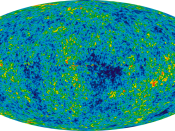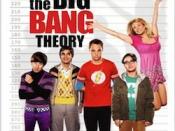Our Universe began approximately 15 billion years ago as a dense, hot globule of gas expanding rapidly outward. Cosmology is the study of the beginning and evolution of the universe. The universe contained nothing but hydrogen and a small amount of helium at the time. There were no stars or planets floating around. Stars only started to form when the Universe was about 100 million years old. There are many theories that describe the origin of our Universe. They range from biblical to the astronomical. The most popular theory out there today is the Big Bang Theory. The Big Bang Theory holds that everything in the universe, stars, galaxies, radiation, interstellar gas, everything was created in one huge explosion.
"Well before the Big Bang theory was proposed, the astronomer Edwin Hubble discovered that distant galaxies are moving away from Earth with a recession velocity proportional to their distance. This observation established the expansion of the universe."
(1) With the use of Doppler shift measurements of radial velocities and distance measurements, Hubble was able to conclude that almost all the galaxies were flying away from the Milky Way Galaxy. "In the 1920s, astronomers had noticed that known spectral lines such as the lines of sodium vapor in the light emanating from distant nebular clouds (later to be known as galaxies) tended to be more shifted towards the red end of the spectrum as they appeared smaller in the field of vision." (2) The red shift was created from this process. When an object is moving away from the Milky Way the light transmitted to us has a longer wavelength (red shifts) than it had when it was emitted. Red shifts occur in almost all galaxies indicating that they are moving away from us. Red shifts become larger when the distance...



GREAT
Really controversial and good description!!!!!!
0 out of 2 people found this comment useful.